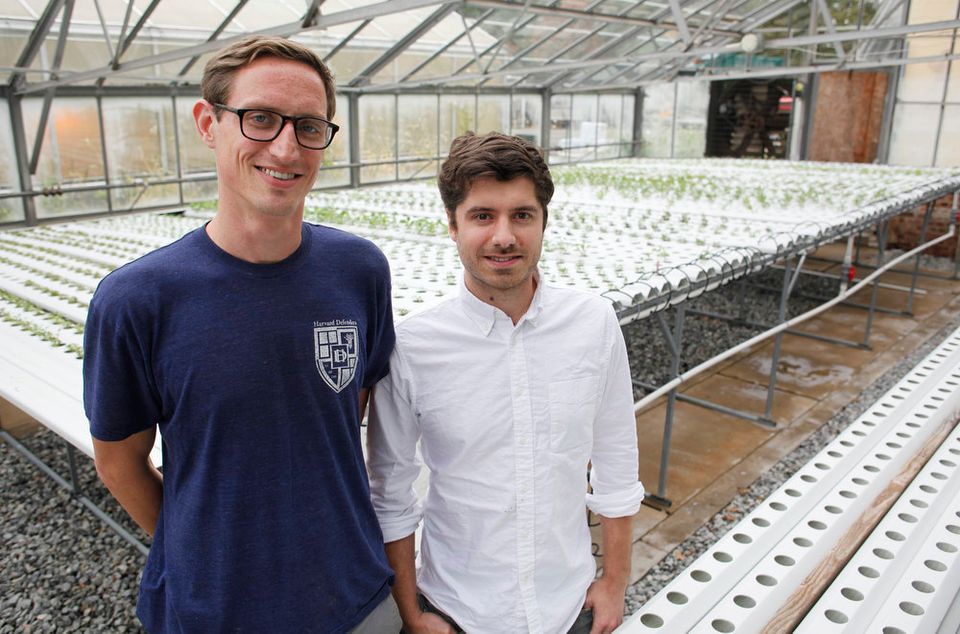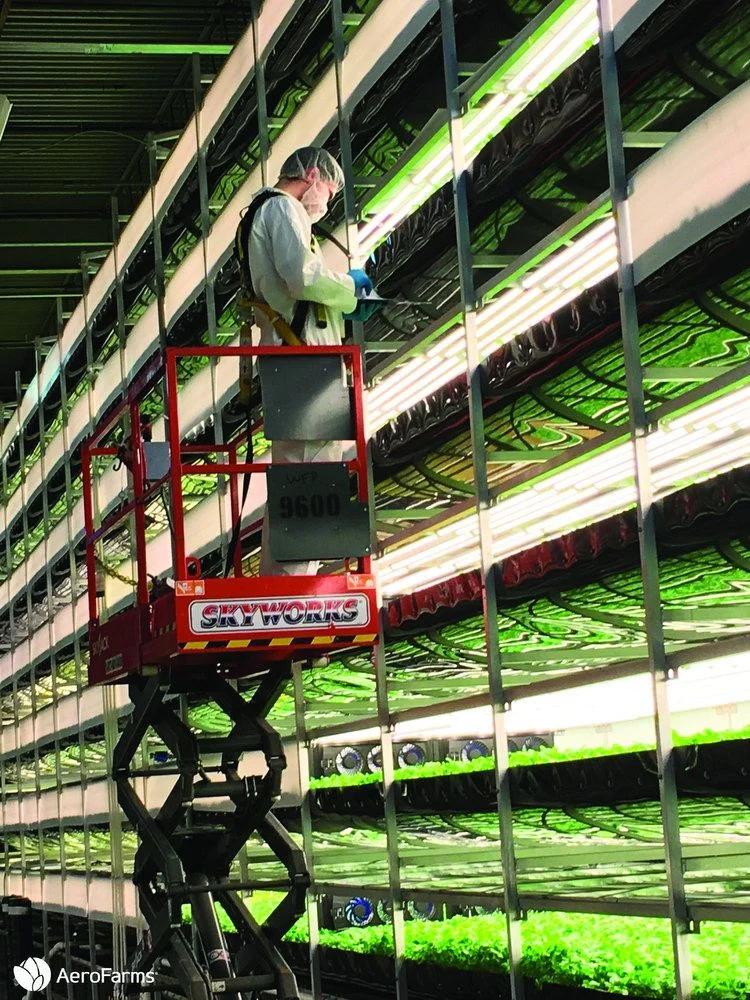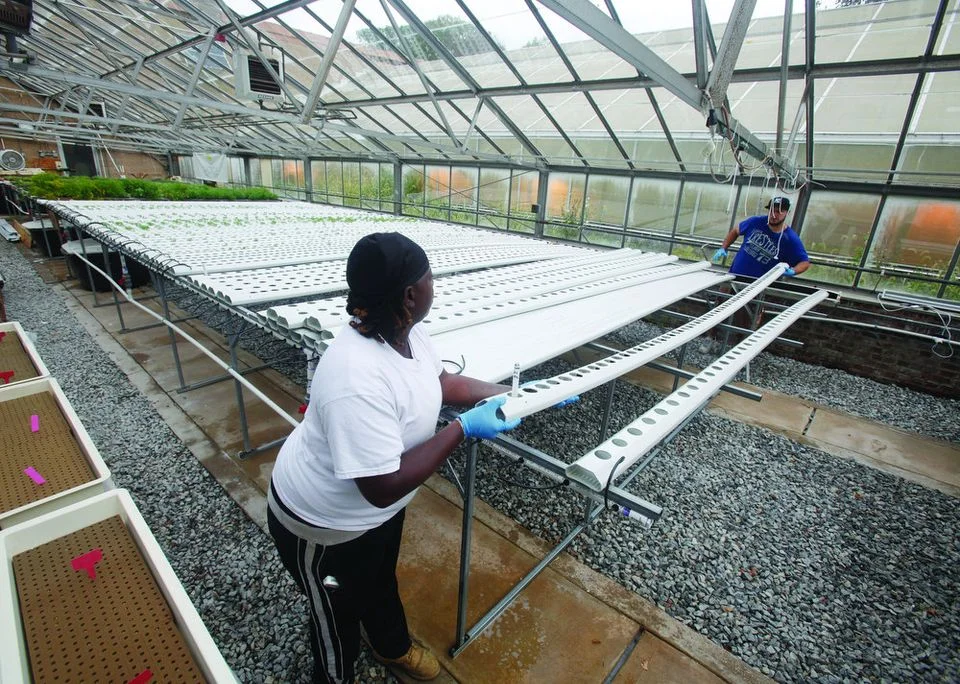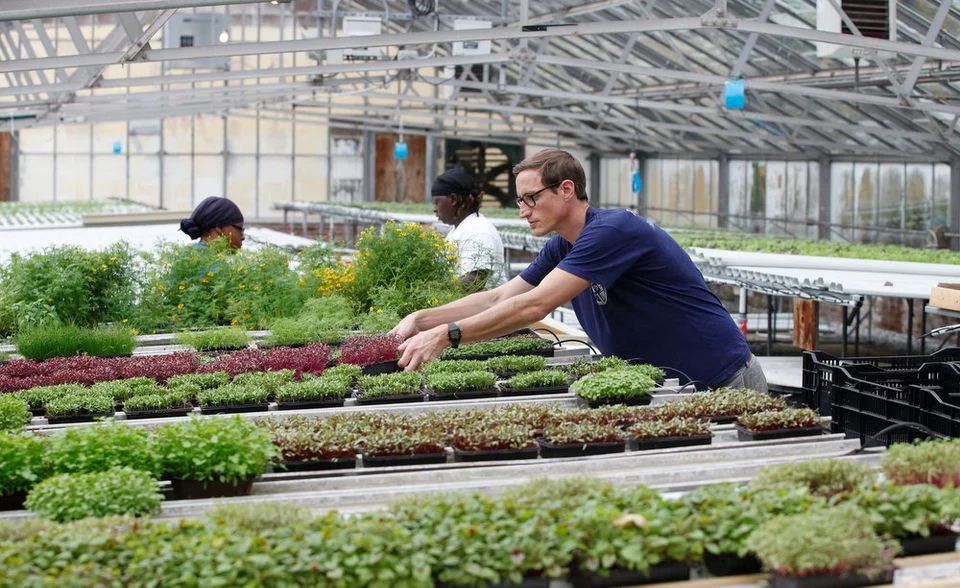Two Companies Taking A Vertical Leap In Newark
Two Companies Taking A Vertical Leap In Newark
By Sarah Fensom
Salad may not be the first thing that springs to mind when thinking of Newark. With its long history of environmental pollution and food deserts, Brick City is not a paragon of health.
Yet in recent years, it has embarked on a quest for wellness. In 2015, a ShopRite opened in the Central Ward, where there had previously been a scarcity of supermarkets. The following year, Newark Beth Israel Medical Center established the Beth Greenhouse, a small hydroponic farm that sells affordable produce in the South Ward.
In 2017, the former Hahne's department store building on Broad Street became home to Newark's first Whole Foods. And even former Newark mayor and current New Jersey senator Cory Booker has gone green, sharing snaps of his plant-based meals on social media and talking publicly about his veganism.
Getting in on the act are AeroFarms and Radicle Farm, two relatively new companies that are growing farm-fresh salad greens not in fields but in the city itself. The larger of the two, AeroFarms, runs several facilities in the Newark area, including a sustainable 70,000-square-foot vertical farm in a former steel plant in the Ironbound section. There, 2 million pounds of greens and herbs are produced each year, using an aeroponic growing method.
The other, Radicle Farm, operates in an 8,000-square-foot greenhouse in Branch Brook Park and grows greens hydroponically in horizontally-oriented plots using a method called nutrient film technique (NFT).
Both methods cut down on the environmental costs of field farming by using less water, less energy, and less space. Growing indoors allows the two companies to bypass fickle weather patterns and maintain the ideal conditions for their crops year-round, increasing both the yield and the freshness of their greens. AeroFarms and Radicle are showcasing two models for efficient, sustainable food growth, all the while helping to place Newark at the forefront of urban farming -- as unlikely as that may seem.
AeroFarms is the vanguard of the vanguard. Based on annual growing capacity, its Ironbound facility on Rome Street houses the largest indoor vertical farm in the world. With projects in development in China, the United Arab Emirates, and Europe, the company has its sights on the world but is still very focused on Newark.
"We embody Mayor Baraka's initiative 'Hire. Buy. Live.,' " says Marc Oshima, the chief marketing officer and a co-founder of AeroFarms. "In Newark alone, we have four farming operations and employ over 120 people -- 40 percent of which live in Newark, with 80 percent within a 15-mile radius."
The company's roots have spread throughout the city, with a research and development farm in a former downtown nightclub on Market Street; a 30,000-square-foot farm on Ferry Street, in what was once Inferno Limits, the paintball and laser-tag arena; and a smaller, 50-square-foot vertical farm in the dining hall of Phillips Academy. The school farm, which has been up and running since 2011, was a catalyst for the company to move its headquarters from Utica, N.Y., to Newark several years ago.
Later this year, AeroFarms is set to open a 78,000-square-foot vertical farm -- its biggest yet -- in Camden.
AeroFarms worked with RBH Group, the developers behind Teachers Village, on its Rome Street facility, with substantial backing from Goldman Sachs and Prudential Investment. (While it has raised some $50 million from investors, AeroFarms has yet to make a profit.)
"We looked at just about every ward and every property, and then we found the opportunity with RBH in the Ironbound and we thought it was somewhere we could make an impact," says Oshima. "There's a food desert right there."
One way AeroFarms is trying to stamp out food deserts is by giving Newark residents immediate access to their products, Oshima says.
"Wherever our farms are, people can come in and get greens all year round."
Many of the supermarkets that sell AeroFarms's retail brand Dream Greens (a 4.5 oz. package retails for $3.99) are extremely close to the farm, as well, reducing the toll that transportation takes on both the environment and the quality of the food.
The distribution center for ShopRite, one of AeroFarms's key partners, is just minutes from the Rome Street farm. "ShopRite puts a lot of emphasis on sourcing produce from local farms in the communities where our stores operate, and AeroFarms offers fresh produce we can source right here in Newark for our local ShopRite store," says Derrick Jenkins, vice president of produce and floral for ShopRite. "AeroFarms is a local business making an investment in Newark, and ShopRite believes it's important to support our neighbors and the city."
AeroFarms was co-founded by Oshima (the only Jersey native of the bunch), David Rosenberg, the company's CEO, and Ed Harwood, the chief science officer. Oshima and Rosenberg, who met in business school, formed a company called Just Greens in 2004. Research into the latest sustainable agricultural methods led them to Harwood, a former professor at Cornell's School of Agriculture, who was perfecting methods of aeroponic farming.
AeroFarms' patented growth method uses neither sun nor soil. The seeds rest on a special reusable cloth, developed by Harwood, which is made of BPA-free recycled plastic. They're housed in mobile modules that can be stacked many stories, effectively creating high-rises for plants.
Unlike with hydroponic methods, the seeds don't sit in water but are instead misted with a solution of nutrients, water, and oxygen deployed by a special nozzle (also developed by Harwood). Because the system is closed, fertilizer isn't leached into the waterways.
The method uses 95 percent less water than traditional farming and 40 percent less than hydroponics. In lieu of sunlight, energy-efficient LED lights supply the exact spectrum, intensity, and frequency that each individual plant needs for photosynthesis. This light system also ensures tyrannical control over each plant's texture, color, flavor, nutrition, shape, and size.
The farms also employ big data, monitoring more than 130,000 data points every harvest. Computer-generated algorithms enable the 250 varieties of greens and herbs the company grows to grow fast, some reaching maturity in two weeks, about half the time as those in the field.
Radicle Farm, though a much smaller operation than AeroFarms, also represents the future of farming. Co-founders Tony Gibbons and Jim Livengood started the company in Newark in 2014 and expanded quickly, adding a 50,000-square-foot facility in Utica in 2015.
Radicle grows a variety of microgreens, such as spinach, kale, tatsoi, and Russian mizuna, which have gained a reputation for their extraordinary flavor. As a measure to ensure freshness and maintain a diminutive carbon footprint, it keeps things exclusive, limiting its delivery zone to a 300-mile radius.
Before Radicle, Gibbons, a native of Maplewood, was immersed in the fine dining world, serving as the maitre d' at the celebrated Manhattan restaurant Gramercy Tavern for nearly a decade. He'd also dipped a toe into sustainable agriculture, establishing Garden State Urban Farms with his mother, Lorraine, in 2008 (together they helped launch the Beth Greenhouse).
Livengood, who grew up in South Orange, was a grant writer at the Liberty Science Center in Jersey City before joining up with Gibbons. While working on an indoor growing exhibition, he became fascinated by traditional agriculture's concerns and hydroponic agriculture's benefits.
"In terms of conserving water and land," says Livengood, "hydroponics sounded like an elegant solution."
He began looking for companies that were using hydroponic and sustainable growing methods and eventually found Gibbons.
When Garden State Urban Farms received a grant to turn the Branch Brook Park greenhouse into a working farm, the space hadn't been used in 20 years and was in bad shape.
"It looked like Jumanji when I first went in there," says Gibbons. With an opportunity to transform the historic space, the duo didn't initially have business in mind.
"Our original goal was just to get it up and running," says Gibbons, "but then, because of how much room was available, we decided to launch Radicle and use the greenhouse as a commercial space."
Still, the operation is a relatively small one, with only five people -- most of whom come through training programs from halfway houses -- working in the space.
"It's important for us to work with the community and give our employees job skills," says Gibbons. "We hire a small number of people and train them to do a lot of things. Most of our employees can do 80 percent of what we do here."
The nutrient film technique that Gibbons and Livengood use in the greenhouse involves irrigating and fertilizing the plants with a recirculating solution that contains all of the nutrients necessary for proper growth. No soil is used; instead, the plants sit in long, pod-like channels with a shallow film of the solution lightly bathing their root systems. Because the fertilizer is contained within the growing system, it doesn't enter the local water table and harm the ecosystem.
The method uses only 10 percent of the water that field farming does. It also cuts down on the use of fossil fuels -- the minimal amount of machinery Radicle employs is powered electrically -- and space.
"It accounts for the needs of the plants, so they're not sprawling out, looking for water like they would in the field," says Livengood. "We can also grow more -- we get five times more yield per square foot because we're growing year-round, and the plants themselves grow two or three times as fast."
As with aeroponics, this hydroponic system can be used to grow any plant, but it is particularly efficient with greens. "Focusing on greens allowed us to start quickly," says Livengood.
Ensuring that their greens taste good is a priority for the Radicle crew, who are always experimenting with what they grow and with various blends in which their products can be sold.
"Selling mixes allows us to be creative with what we send our customers," says Gibbons. Their "Chef's Selection" blend, for example, combines red and green romaine lettuce with bitter mustard greens, as well as peppery arugula and mizunas. The result is a fiery mixture of piquant flavors.
The "Petal Power" adds a visual pop, with edible flowers joining beet greens, baby chard, and romaine.
This attention to look and flavor has helped Radicle develop a niche fan base among fine restaurants in New York and Jersey City.
"In the very beginning," says Gibbons, "we had success with restaurants in New Jersey that were Italian in an authentic way, which makes sense because Italian cooking is defined by going to the market and getting fresh food."
Arturo's, an osteria and pizzeria in Maplewood, was one of Radicle's first clients. "When they first started, their production was limited to primarily delivering to us and Gramercy Tavern," says Fred Shandler, the owner
of Arturo's. "To see how far they've grown and leveraged that experience into Radicle Farm is pretty impressive. Their product and overall operation are really solid. We'll regularly receive awesome basil or a micro green (that's delivered while still in its root system) and literally use it the same day."
Radicle sells its blends straight from the farm to consumers through Fresh Direct and several grocery stores across New Jersey, such as Whole Foods. A 4-ounce package sells at the same price point as AeroFarms's Dream Greens, $3.99.








